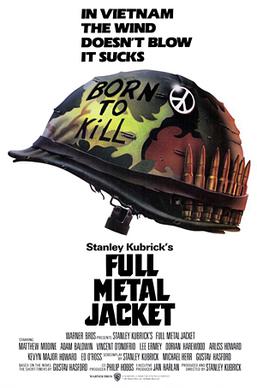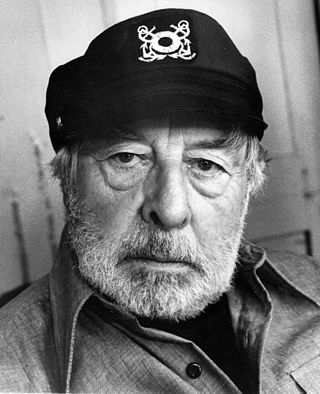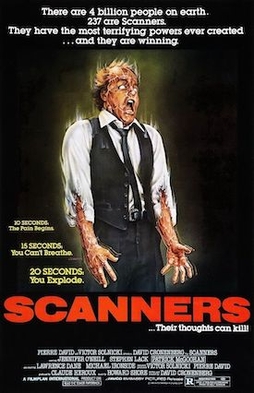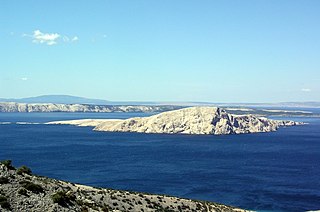
David Alan Mamet is an American playwright, filmmaker, and author.

Full Metal Jacket is a 1987 psychological war drama film directed and produced by Stanley Kubrick from a screenplay he co-wrote with Michael Herr and Gustav Hasford. The film is based on Hasford's 1979 autobiographical novel The Short-Timers. It stars Matthew Modine, R. Lee Ermey, Vincent D'Onofrio, Adam Baldwin, Dorian Harewood, and Arliss Howard.

The Day the Earth Stood Still is a 1951 American science fiction film from 20th Century Fox, produced by Julian Blaustein and directed by Robert Wise. It stars Michael Rennie, Patricia Neal, Hugh Marlowe, Sam Jaffe, Billy Gray, Frances Bavier and Lock Martin. The screenplay was written by Edmund H. North, based on the 1940 science fiction short story "Farewell to the Master" by Harry Bates. The film score was composed by Bernard Herrmann. Set in the Cold War during the early stages of the nuclear arms race, the storyline involves a humanoid alien visitor who comes to Earth, accompanied by a powerful robot, to deliver an important message that will affect the entire human race. In 1995, the film was selected for preservation in the United States National Film Registry as "culturally, historically, or aesthetically significant".

Wag the Dog is a 1997 American black comedy political satire film starring Dustin Hoffman and Robert De Niro. Produced and directed by Barry Levinson, the film centers on a spin doctor and a Hollywood producer who fabricates a war in Albania to distract voters from a presidential sex scandal. The screenplay by Hilary Henkin and David Mamet was loosely adapted from Larry Beinhart's 1993 novel, American Hero.

"The War of the Worlds" was a Halloween episode of the radio series The Mercury Theatre on the Air directed and narrated by Orson Welles as an adaptation of H. G. Wells's novel The War of the Worlds (1898) that was performed and broadcast live at 8 pm ET on October 30, 1938, over the CBS Radio Network. The episode is famous for inciting a panic by convincing some members of the listening audience that a Martian invasion was taking place, though the scale of panic is disputed, as the program had relatively few listeners.

Notorious is a 1946 American spy film noir directed and produced by Alfred Hitchcock, starring Cary Grant, Ingrid Bergman, and Claude Rains as three people whose lives become intimately entangled during an espionage operation.

John Houseman was a Romanian-born British-American actor and producer of theatre, film, and television. He became known for his highly publicized collaboration with director Orson Welles from their days in the Federal Theatre Project through to the production of Citizen Kane and his collaboration, as producer of The Blue Dahlia, with writer Raymond Chandler on the screenplay. He won the Academy Award for Best Supporting Actor for his portrayal of Professor Charles W. Kingsfield in the 1973 film The Paper Chase. He reprised the role of Kingsfield in the 1978 television series adaptation.

Scanners is a 1981 Canadian science fiction horror film written and directed by David Cronenberg and starring Stephen Lack, Jennifer O'Neill, Michael Ironside, and Patrick McGoohan. In the film, "scanners" are psychics with unusual telepathic and telekinetic powers. ConSec, a purveyor of weaponry and security systems, searches out scanners to use them for its own purposes. The film's plot concerns the attempt by Darryl Revok (Ironside), a renegade scanner, to wage a war against ConSec. Another scanner, Cameron Vale (Lack), is dispatched by ConSec to stop Revok.

Full Metal Panic! is a series of light novels written by Shoji Gatoh and illustrated by Shikidouji. The series follows Sousuke Sagara, a member of the covert anti-terrorist private military organization known as Mithril, tasked with protecting Kaname Chidori, a hot-headed Japanese high school girl born with strange abilities that attracts the attention of various antagonistic groups.

Thea Gabriele von Harbou was a German screenwriter, novelist, film director, and actress. She is remembered as the screenwriter of the science fiction film classic Metropolis (1927) and for the 1925 novel on which it was based. von Harbou collaborated as a screenwriter with film director Fritz Lang, her husband, during the period of transition from silent to sound films.

The Lost Boys is a 1987 American black comedy horror film directed by Joel Schumacher, produced by Harvey Bernhard with a screenplay written by Jeffrey Boam, Janice Fischer and James Jeremias, from a story by Fischer and Jeremias. The film's ensemble cast includes Corey Feldman, Jami Gertz, Corey Haim, Edward Herrmann, Barnard Hughes, Jason Patric, Kiefer Sutherland, Jamison Newlander and Dianne Wiest.

Postmodern literature is a form of literature that is characterized by the use of metafiction, unreliable narration, self-reflexivity, intertextuality, and which often thematizes both historical and political issues. This style of experimental literature emerged strongly in the United States in the 1960s through the writings of authors such as Kurt Vonnegut, Thomas Pynchon, William Gaddis, Philip K. Dick, Kathy Acker, and John Barth. Postmodernists often challenge authorities, which has been seen as a symptom of the fact that this style of literature first emerged in the context of political tendencies in the 1960s. This inspiration is, among other things, seen through how postmodern literature is highly self-reflexive about the political issues it speaks to.

Goli Otok is a barren, uninhabited island that was the site of a political prison which was in use when Croatia was part of Yugoslavia. The prison was in operation between 1949 and 1989.

Sphere is a 1998 American science fiction psychological thriller film directed and produced by Barry Levinson, adapted by Kurt Wimmer, and starring Dustin Hoffman, Sharon Stone and Samuel L. Jackson. It is based on Michael Crichton's novel of the same name. The film was released in the United States on February 14, 1998.

Lawrence George Cohen was an American filmmaker. He originally emerged as the writer of blaxploitation films such as Black Caesar and Hell Up in Harlem, before becoming known as an author of horror and science fiction films — often containing police procedural and satirical elements — during the 1970s and 1980s. His directorial works include It's Alive (1974) and its sequels, God Told Me To (1976), The Stuff (1985) and A Return to Salem's Lot (1987).

Philip Ives Dunne was an American screenwriter, film director and producer, who worked prolifically from 1932 until 1965. He spent the majority of his career at 20th Century Fox. He crafted well regarded romantic and historical dramas, usually adapted from another medium. Dunne was a leading Screen Writers Guild organizer and was politically active during the "Hollywood Blacklist" episode of the 1940s–1950s. He is best known for the films How Green Was My Valley (1941), The Ghost and Mrs. Muir (1947), The Robe (1953) and The Agony and the Ecstasy (1965).

Jane Eyre is a 1943 American film adaptation of Charlotte Brontë's 1847 novel of the same name, released by 20th Century Fox. It was directed by Robert Stevenson and produced by the uncredited Kenneth Macgowan and Orson Welles; Welles also stars in the film as Edward Rochester, with Joan Fontaine playing the title character.

Son of Dracula is a 1943 American horror film directed by Robert Siodmak with a screenplay based on an original story by his brother Curt Siodmak. The film stars Lon Chaney Jr., Louise Allbritton, Robert Paige, Evelyn Ankers, and Frank Craven. The film is set in the United States, where Count Alucard has just taken up residence. Katherine Caldwell (Allbritton), a student of the occult, becomes fascinated by Alucard and eventually marries him. Katherine begins to look and act strangely, leading her former romantic partner Frank Stanley (Paige) to suspect that something has happened to her. He gets help from Dr. Brewster (Craven) and psychologist Laszlo who come to the conclusion that Alucard is a vampire.

Experimental literature is a genre of literature that is generally "difficult to define with any sort of precision." It experiments with the conventions of literature, including boundaries of genres and styles; for example, it can be written in the form of prose narratives or poetry, but the text may be set on the page in differing configurations than that of normal prose paragraphs or in the classical stanza form of verse. It may also incorporate art or photography. Furthermore, while experimental literature was traditionally handwritten, the digital age has seen an exponential use of writing experimental works with word processors.

Don't Panic Chaps! is a 1959 British comedy film directed by George Pollock and starring Dennis Price, George Cole, Thorley Walters and Terence Alexander. The film was written by Michael Corston, Jack Davies and Ronald Holroyd, and produced by Teddy Baird for ACT Films. Originally called Carry On Chaps, the title was changed following the success of the Carry On series.



















